

 |
 |
||||
| Home | Reviews | Extras | Forums |
|
ArteSynopsisSince childhood, Arte Spaletti has wanted to be an artist. However, facing the great hurdle of being a woman in a very man-dominated field of work does present its share of hurdles, which she faces with all the energy she can muster. With her mother burning, if not all, then at least a lot of her small piece of artwork she has made up to that point, it gives her the final push she needed to leave her life as a noblewoman behind to become the very model of a starving artist. ReviewI've seen my share of shows with female leads up through my years as an anime fan and reviewer, though how many of them have a more obvious feminist leaning, I can't say for sure. Arte is definitely one of those shows that chooses a rather clear setup for itself, and to be entirely truthful to you all, that sort of thing does tend to make me a bit nervous. Thankfully, Arte chooses to go the relatively cheerful route with its message, with a female lead that impresses its male support cast with tenacity and the talent to back it up. 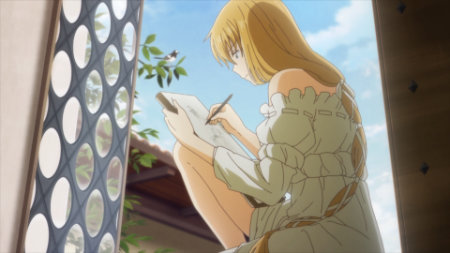  Basically, the show is pointedly about its themes, sometimes very directly, but also sometimes also sneaky and subtle about it. Arte is not here to put you in a chair and lecture you until you resignedly shout "OH, FINE!" Rather, it starts off on the right foot by starting us off with a main lead that is honestly excited about the concept of art and the will to defy even her mother if need be. Its not even moralizing, because the show isn't shy about pointing out that Arte herself is going to have to make some sacrifices even unrelated to being a woman if she wants to follow this path. But it also points out that her position as a noble even gives her some advantages she wouldn't otherwise have, even if all of that only counts for the time before she makes the official decision to try for apprenticeship. Plus, she also had a father who honestly loved her and supported her in all her endeavours, productive or otherwise. It's not like I can't understand where her mother is coming from; being a noblewoman in that era was probably never a comfortable prospect for anyone, and her attitude is merely a reflection of the attitude women faced, particularly ones born into noble families. Of course, the people in Arte also faces another poor aspect of its era -- the class divide -- and Arte isn't so focused in its message that it ignores other troubled aspects that doesn't necessarily damage only women. It's still the core message, of course, as it should be; more than "just" being an artist, Arte wants control over her own life. Arte is also a surprisingly positive person despite the hurdles she has to face. Granted, I already mentioned she had a father that supported her in the things that made her happy, which I'm sure played a rather heavy part in why she turned out the way she did personalitywise, but it's still her own desires that makes her overcome the downright herculean tasks before her. Rather than demand that people should pay attention to her, she's thankful when someone does give her a chance. In this case, Leo presents one of the few times where a man isn't offended about Arte because she's a woman, but because she's a noble while Leo himself had to endure hardships that even the common people found beneath themselves; being in a family of beggars. Leo fulfills most of the aspects of the gruff mentor character; he seems awfully dour, although given his past, that is understandable. But due to that lack of social mores, he's also the first who even deigns to look at her art, and even if he also is trying to get rid of her by giving her a ridiculous task to overcome, he still makes good on his word when she actually completed said task. He even breaks into barely contained gigglefits when Arte has her more expressionate moments, which is adorable as heck. Of course, that's Arte's main plan anyway, and Leo merely becomes the first man she wins over by dint of her tenacity. Having been a noble, Arte isn't particularly used to physical labor, and the show does not sugarcoat the price she sometimes pays for her efforts. I probably made that sound more severe than it really is, but what that means is that Arte isn't going to suddenly develop the strength needed to do hard labor in one day. Sometimes that is even put to comedic effect, like when Arte agrees to carry ten bags of cement into storage for the chance to sketch a statue inside an art studio. She completed her task with no small effort, only to find that said effort rendered her hands unable to do precisionwork like drawing. It all worked out for the best, though, because the master of said workshop was so amused by the whole situation -- on top of impressed by her work -- that he allowed her to drop by whenever she wanted to in the future. On top of that, Arte's efforts are all the more impressive because she's basically 14 years old. Again, the story is a product of its time, but due to the art style and Arte's design, she still looks older than that. Yet, again, all this comes with the uncomfortable truth that noblewomen like her are generally left with the option of marriage and... well, that's about it if you don't have Arte's drive and courage. And even that might not be enough for everyone, depressing as it might sound. And getting married at 15 is about as uncomfortable thought for a more modern era as you can think of, I'd imagine. The same might be said about Arte's crush on Leo after a certain escapade, which, given Leo's age, isn't going to endear a modern audience if the show chooses to pursue it. But at least it hasn't done so as of yet, and I can give the show that it isn't entirely uncommon for younger people to crush on older peers, and not just girls at that. 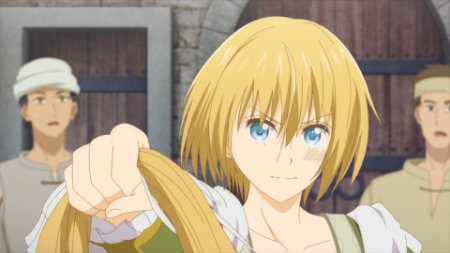 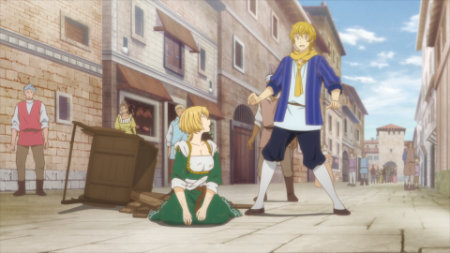 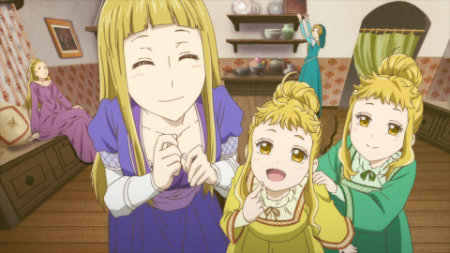 Since the show is about artists and their art, it is appropriate that Arte generally features an "at worst" pretty decent quality of animation set to appealing character designs that strike a good balance between a realistic and a more drawn and animated look. While Arte herself can get pretty gung ho at times, this isn't really a high-energy show. Yet, Arte herself goes through quite a few expressions even when she's caught up in her own head for a while, trying to figure out where she stands, either figuratively or literally. As for Leo, well.... even if the show doesn't really need the excuse, I imagine the animators still appreciated being able to work with a more stone-faced sort, not that it prevented him from devolving into gigglefits when faced with Arte's amusing reactions to her own mental gymnastics. In short, Arte is a pretty good looking show. In the story progression we get for 12 episodes, obviously Arte isn't going to fulfill all her dreams, or even most of them. As anime based on manga still in production, Arte becomes another show in the long lineup of shows that fills in the "a good start" bracket, where you can only hope it gains enough traction for more to be made. As one would expect, the first part of Arte is very day-to-day, since everything is new, and most commonly a hurdle that Arte needs to overcome to progress. The last half of the show, however, gives Arte a more long-running story arc when she's tasked with painting a portrait for a wealthy noblewoman while at the same time secretively being tasked with getting through to another young girl whose future prospects seems depressingly centered on "finding her a husband", but also have a secret dream of her own. Unfortunately for her, neither of her parents seem very keen on sharing in on those dreams; her father in particular seems vehemently opposed to anything unrelated to making herself appealing towards potential husbands, so it is her uncle who must step up to the plate in both their steads. It's a bit harder to tell whether I should count this as a negative, though, because of my aforementioned apprehension, but some of the dialogue in the show can get a bit on the nose. Mostly this is due to whenever Arte wants to do something deemed "inappropriate" for her gender, the show goes into a montage of (mostly) men going "A woman? Here?! Get out, get out, get out!" And even when we have a character who wants to do well towards women, like the ever gentlemanly Angelo, he still unknowingly inconveniences her when he offers to take all the heavy loads off her hands. The show understands very well how social conditioning works, and Angelo to his credits doesn't really understand how him treating women like that will hurt them in the long run. This even extends to his three sisters, who in a modern context would come across as demanding and lazy, but given the era in which this show is taking place, it's just the way they've been raised. Angelo, finally understanding what Arte was getting at, even requests them to try to help themselves for a change -- adding that "they can do much more that they think they can" -- leaves his sisters shocked, but also intrigued. On the flipside, Arte also introduces us to Veronica, a high class courtesan who simply can't adapt Arte's method of open courtesy. Arte fairly early gets introduced to how Veronica treats the men that make up her customer base, and while it is endearing to see that Arte finds her treatment kind of unfair, it also realistically points out why Veronica simply isn't in a position to play nice if she wants to continue being able to support her family. In some ways, she's even more entrenched in a system that favors class more than anything else than Arte is, and it adds a nice complexity to the whole social setup that makes up the world Arte lives in. 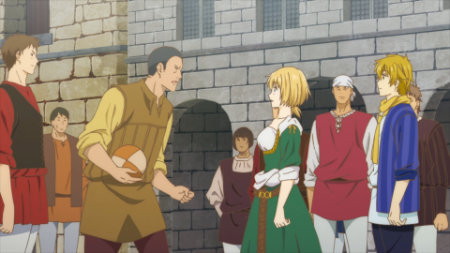 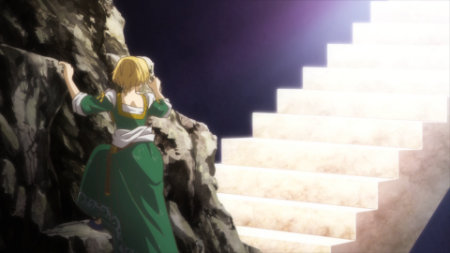 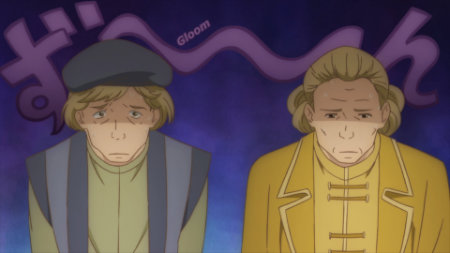 In the end, Arte ticks off many of the boxes that makes a "can do" show fun to watch. It doesn't lean too hard on cynisism or lecturing its viewers, but still doesn't present any kind of romanticized world for them to live in. Arte rather lets its nakesake's determination do all the speaking, while also having her being understanding and approachable even when dealing with strangers. She isn't interested in getting into any yelling matches, because she's intelligent enough to know they lead absolutely nowhere, but she will also not stand down if she has decided on what she wants to do in her life and which steps she needs to take to get there. This isn't an entirely new concept, of course; it's been Studio Ghibli's bread and butter for quite a few years, but it's still nice to see when a new show steps up to the plate and gives it some good swings. Despite a few creative liberties that I would probably never have realized had I not read Rebecca Silverman's rundown over at ANN, I found Arte to be a pretty nice summation of what difficulties a woman like Arte would face going down the path she did. It strikes a pretty good balance of realism and optimstic fancy, with enough art nerdery to make it a worthwhile watch. — Stig Høgset Recommended Audience: The little fanservice there is, mostly just corset-boosted cleavages, is period apprpriate and very mild. Storywise, though, it's accurate enough to feature women who support themselves through prostitution, as well as a depressing explantion of what happens to you if you're not "good" at it -- by which I mean not good at the actual act of sex, but good at making men want you to a feverish degree. Version(s) Viewed: Digital stream on Wakanime (Europe) Review Status: Full (12/12) Arte © 2020 Kei Ohkubo/COAMIX, Arte Production Committee |
 |
|
| © 1996-2015 THEM Anime Reviews. All rights reserved. |